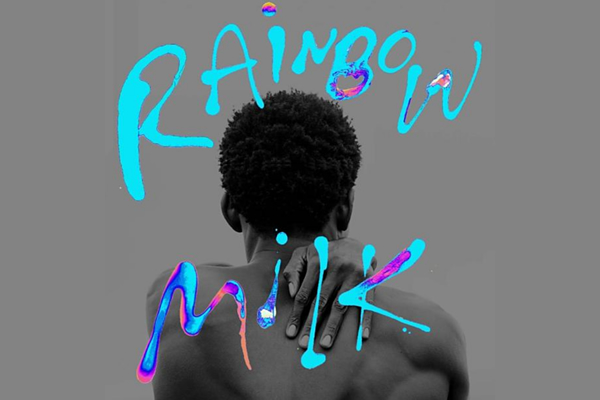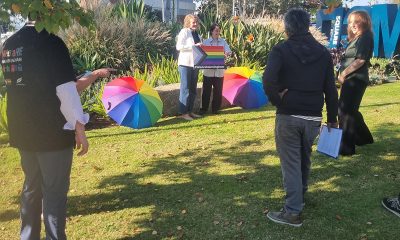Books
Catching up with ‘Rainbow Milk’ author Paul Mendez
Widely praised novel began as memoir

In 2004, Black, gay writer Paul Mendez, then 22, was in London, studying acting. To pay for the acting classes, he was a sex worker.
Today, Mendez, now 39, is one of the hottest authors on the literary scene. His debut novel “Rainbow Milk,” published in the United Kingdom last year and released this month in the United States, has received wide praise.
The BBC, the Observer and other U.K. outlets put “Rainbow Milk” on their best books of 2020 lists.
Recently, Mendez spoke with the Blade on FaceTime about a range of topics.
Mendez grew up in a working class family as a Jehovah’s Witness in Dudley, a town in an industrial region called the Black Country in the West Midlands, a county in central England.
His grandparents came to the U.K. from Jamaica as part of the Windrush generation.
The term “Windrush generation” refers to people from Caribbean countries who emigrated to the U.K. between 1948 and 1971. They were encouraged to come to the United Kingdom because of labor shortages after World War II. Yet, they encountered racism and hostility to immigration when they arrived in the U.K.
Because of his sexual orientation, Mendez was “disfellowshipped” by his Jehovah’s Witness family and church.
Now, Mendez lives in London with his partner Alan Hollinghurst. Hollinghurst, a novelist, was born in Stroud in Gloucestershire, England in 1954. He was awarded the Man Booker Prize for his novel “The Line of Beauty.”
“Rainbow Milk” begins in the 1950s. Norman and Claudette, middle-class newlyweds in Jamaica emigrate to England. They’re part of the Windrush generation. They hope their future will be better in the U.K. But, on arriving there, they encounter racism and have trouble finding suitable work. When Norman starts to lose his eyesight, the family’s survival is at risk. Norman narrates this part of the novel in the first person.
The rest of “Rainbow Milk” takes place 50 years later. Here, we meet the protagonist of the novel: Jesse McCarthy, a young Black, gay British man. Jesse is Norman’s grandson.
Jesse’s mother is Black and his stepfather is white. He’s never known his father who left the family when he was a baby. He and his working-class family, who are Jehovah’s Witnesses, live in the industrial region of the Black Country.
Nineteen-year-old Jesse is bright and a devout Jehovah’s Witness. He is considered to be a potential leader by members of the church. But Jesse begins to think he might be queer. He knows he needs to keep this a secret.
His attempt at secrecy fails. Jesse is disfellowshipped by Jehovah’s Witnesses after a church member outs him.
In 2002, Jesse escapes to London to create a life for himself as a queer, Black working-class man. Jesse becomes a sex worker to stay afloat and explores his sexuality. He reckons with race, class, sexuality, and spirituality in his search for self-discovery, freedom and the stability of a chosen family.
“You’ve lost your center of gravity,” a friend says to Jesse, “so to survive, you’ll need to take steps to create another.”
In “Rainbow Milk,” Jesse evolves from a young man (not yet out of his teens) trying to navigate life in a strange city into an adult who’s a writer in a stable queer relationship.
There are some similarities between Jesse and Mendez. Both are Black, queer and were disfellowshipped by the Jehovah’s Witnesses. They’re British with a Jamaican heritage, they both moved to London and became sex workers as well as writers.
“Rainbow Milk” is both “autobiographical and fictional,” Mendez said. Yet, though it has elements of autobiography, “It’s a work of fiction,” he said. “I’ve created unique scenes that I didn’t go through personally, but I went through, maybe, something similar, with other people.”
He created characters “with interiors,” Mendez added. One difference: Jesse moved to London at a different age and year (at 19 in 2002) than when Mendez moved to London (at age 22 in 2004).
Mendez researched what London was like then and created characters who didn’t share his story.
Jesse, for instance, has a white father. Mendez’s dad is Black and married to his mother.
“It became interesting for me to examine what it’s like to be raised as a Black person without any sense of [Black] heritage,” Mendez said.
It’s hard to answer the question of whether a novel is autobiographical, Mendez said. Hollinghurst, for instance, went to boarding school, studied at Oxford, became an editor at a literary journal and then a novelist.
“That’s the kind of world, he writes about,” Mendez said, “but they’re not him.”
People should be able to tell the difference between a memoir and a work of fiction, he added.
“Rainbow Milk” began as a memoir but his publisher challenged Mendez. “She recognized that I wasn’t going all the way,” Mendez said, “I was protecting people. I was reticent when it came to discussing some of the most difficult moments that I’d been through.”
The novel began to flow when he switched to fiction and began writing in the third person. “I wasn’t reopening old wounds,” Mendez said.
Mendez has been a performing member of two theater companies and worked as a voice actor, appearing on audio books by Andrea Levy, Paul Theroux and Ben Okri. He narrates the audio version of “Rainbow Milk.” Mendez has contributed to “Esquire,” “Vogue” and other publications. He is studying for an M.A. in Black British Literature at Goldsmiths, University of London.
Because he’s so busy, Mendez is taking a year off from his studies. He’s thinking about his second novel and working with a production company to adapt “Rainbow Milk” into a TV series.
Adapting “Rainbow Milk” for TV has been different for Mendez from working on “Rainbow Milk” first as a memoir, then as a novel.
“In picking apart ‘Rainbow Milk’ to construct 10 episodes,” Mendez said, “you do see where the narrative thread could have been worked out a little bit better.”
“It will be wonderful to see a visual Jesse,” Mendez added.
“Rainbow Milk” came out in the U.K. soon after George Floyd was murdered. In the aftermath of Floyd’s death, voices like his and other Black writers in the U.K. have been more sought after, Mendez said.
“It’s felt at times that I’m the name on everyone’s lips,” Mendez said. “We need a Black person. Let’s call Paul Mendez. We’ve heard of him.”
“I think only five books by five Black British men have been published over the last five years,” Mendez said.
There is hope that this will change. Mendez is a member of the Black Writers Guild, which was formed last June. “We’ve come together to hold the mainstream publishing industry to account,” he said.
The Guild wrote an open letter to the “big five” publishers in the U.K. calling upon the overwhelming white publishing industry to become more inclusive.
“They all vowed to work closely with me to help effect change,” Mendez said, “it’s what are we going to do in the long term to systematically include Black voices in the publishing industry?”
Books are the way to change people’s lives, he added.
Books
Two new books on dining out LGBTQ-style
Visit nightclubs, hamburger joints, and a bathhouse that feeds customers

‘What is Queer Food? How We Served a Revolution’
By John Birdsall
c.2025, W.W. Norton
$29.99/304 pages
‘Dining Out: First Dates, Defiant Nights, and Last Call Disco Fries at America’s Gay Restaurants’
By Erik Piepenburg
c.2025, Grand Central
$30/352 pages
You thought a long time about who sits where.
Compatibility is key for a good dinner party, so place cards were the first consideration; you have at least one left-hander on your guest list, and you figured his comfort into your seating chart. You want the conversation to flow, which is music to your ears. And you did a good job but, as you’ll see with these two great books on dining LGBTQ-style, it’s sometimes not who sits where, but whose recipes were used.
When you first pick up “What is Queer Food?” by John Birdsall, you might miss the subtitle: “How We Served a Revolution.” It’s that second part that’s important.

Starting with a basic gay and lesbian history of America, Birdsall shows how influential and (in)famous 20th century queer folk set aside the cruelty and discrimination they received, in order to live their lives. They couldn’t speak about those things, he says, but they “sat down together” and they ate.
That suggested “a queer common purpose,” says Birdsall. “This is how who we are, dahling, This is how we feed our own. This is how we stay alive.”
Readers who love to cook, bake or entertain, collect cookbooks, or use a fork will want this book. Its stories are nicely served, they’re addicting, and they may send you in search of cookbooks you didn’t know existed.
Sometimes, though, you don’t want to be stuck in the kitchen, you want someone else to bring the grub. “Dining Out” by Erik Piepenburg is an often-nostalgic, lively look at LGBTQ-friendly places to grab a meal – both now and in the past.

In his introduction, Piepenburg admits that he’s a journalist, “not a historian or an academic,” which colors this book, but not negatively. Indeed, his journeys to “gay restaurants” – even his generous and wide-ranging definitions of the term – happily influence how he presents his narrative about eateries and other establishments that have fed protesters, nourished budding romances, and offered audacious inclusion.
Here, there are modern tales of drag lunches and lesbian-friendly automats that offered “cheap food” nearly a century ago. You’ll visit nightclubs, hamburger joints, and a bathhouse that feeds customers on holidays. Stepping back, you’ll read about AIDS activism at gay-friendly establishments, and mostly gay neighborhood watering holes. Go underground at a basement bar; keep tripping and meet proprietors, managers, customers and performers. Then take a peek into the future, as Piepenburg sees it.
The locales profiled in “Dining Out” may surprise you because of where they can be found; some of the hot-spots practically beg for a road trip.
After reading this book, you’ll feel welcome at any of them.
If these books don’t shed enough light on queer food, then head to your favorite bookstore or library and ask for help finding more. The booksellers and librarians there will put cookbooks and history books directly in your hands, and they’ll help you find more on the history and culture of the food you eat. Grab them and you’ll agree, they’re pretty tasty reads.
The Blade may receive commissions from qualifying purchases made via this post.

You’re going to be on your feet a lot this month.
Marching in parades, dancing in the streets, standing up for people in your community. But you’re also likely to have some time to rest and reflect – and with these great new books, to read.
First, dip into a biography with “Marsha: The Joy and Defiance of Marsha P. Johnson” by Tourmaline (Tiny Rep Books, $30), a nice look at an icon who, rumor has it, threw the brick that started a revolution. It’s a lively tale about Marsha P. Johnson, her life, her activism before Stonewall and afterward. Reading this interesting and highly researched history is a great way to spend some time during Pride month.
For the reader who can’t live without music, try “The Dad Rock That Made Me a Woman” by Niko Stratis (University of Texas Press, $27.95), the story of being trans, searching for your place in the world, and finding it in a certain comfortable genre of music. Also look for “The Lonely Veteran’s Guide to Companionship” by Bronson Lemer (University of Wisconsin Press, $19.95), a collection of essays that make up a memoir of this and that, of being queer, basic training, teaching overseas, influential books, and life.
If you still have room for one more memoir, try “Walk Like a Girl” by Prabal Gurung (Viking, $32.00). It’s the story of one queer boy’s childhood in India and Nepal, and the intolerance he experienced as a child, which caused him to dream of New York and the life he imagined there. As you can imagine, dreams and reality collided but nonetheless, Gurung stayed, persevered, and eventually became an award-winning fashion designer, highly sought by fashion icons and lovers of haute couture. This is an inspiring tale that you shouldn’t miss.
No Pride celebration is complete without a history book or two.
In “Trans History: From Ancient Times to the Present Day” by Alex L. Combs & Andrew Eakett ($24.99, Candlewick Press), you’ll see that being trans is something that’s as old as humanity. One nice part about this book: it’s in graphic novel form, so it’s lighter to read but still informative. Lastly, try “So Many Stars: An Oral History of Trans, Nonbinary, Genderqueer, and Two-Spirit People of Color” by Caro De Robertis (Algonquin Books of Chapel Hill. $32.00) a collection of thoughts, observations, and truths from over a dozen people who share their stories. As an “oral history,” you’ll be glad to know that each page is full of mini-segments you can dip into anywhere, read from cover to cover, double-back and read again. It’s that kind of book.
And if these six books aren’t enough, if they don’t quite fit what you crave now, be sure to ask your favorite bookseller or librarian for help. There are literally tens of thousands of books that are perfect for Pride month and beyond. They’ll be able to determine what you’re looking for, and they’ll put it directly in your hands. So stand up. March. And then sit and read.
a&e features
James Baldwin bio shows how much of his life is revealed in his work
‘A Love Story’ is first major book on acclaimed author’s life in 30 years

‘Baldwin: A Love Story’
By Nicholas Boggs
c.2025, FSG
$35/704 pages
“Baldwin: A Love Story” is a sympathetic biography, the first major one in 30 years, of acclaimed Black gay writer James Baldwin. Drawing on Baldwin’s fiction, essays, and letters, Nicolas Boggs, a white writer who rediscovered and co-edited a new edition of a long-lost Baldwin book, explores Baldwin’s life and work through focusing on his lovers, mentors, and inspirations.
The book begins with a quick look at Baldwin’s childhood in Harlem, and his difficult relationship with his religious, angry stepfather. Baldwin’s experience with Orilla Miller, a white teacher who encouraged the boy’s writing and took him to plays and movies, even against his father’s wishes, helped shape his life and tempered his feelings toward white people. When Baldwin later joined a church and became a child preacher, though, he felt conflicted between academic success and religious demands, even denouncing Miller at one point. In a fascinating late essay, Baldwin also described his teenage sexual relationship with a mobster, who showed him off in public.
Baldwin’s romantic life was complicated, as he preferred men who were not outwardly gay. Indeed, many would marry women and have children while also involved with Baldwin. Still, they would often remain friends and enabled Baldwin’s work. Lucien Happersberger, who met Baldwin while both were living in Paris, sent him to a Swiss village, where he wrote his first novel, “Go Tell It on the Mountain,” as well as an essay, “Stranger in the Village,” about the oddness of being the first Black person many villagers had ever seen. Baldwin met Turkish actor Engin Cezzar in New York at the Actors’ Studio; Baldwin later spent time in Istanbul with Cezzar and his wife, finishing “Another Country” and directing a controversial play about Turkish prisoners that depicted sexuality and gender.
Baldwin collaborated with French artist Yoran Cazac on a children’s book, which later vanished. Boggs writes of his excitement about coming across this book while a student at Yale and how he later interviewed Cazac and his wife while also republishing the book. Baldwin also had many tumultuous sexual relationships with young men whom he tried to mentor and shape, most of which led to drama and despair.
The book carefully examines Baldwin’s development as a writer. “Go Tell It on the Mountain” draws heavily on his early life, giving subtle signs of the main character John’s sexuality, while “Giovanni’s Room” bravely and openly shows a homosexual relationship, highly controversial at the time. “If Beale Street Could Talk” features a woman as its main character and narrator, the first time Baldwin wrote fully through a woman’s perspective. His essays feel deeply personal, even if they do not reveal everything; Lucian is the unnamed visiting friend in one who the police briefly detained along with Baldwin. He found New York too distracting to write, spending his time there with friends and family or on business. He was close friends with modernist painter Beauford Delaney, also gay, who helped Baldwin see that a Black man could thrive as an artist. Delaney would later move to France, staying near Baldwin’s home.
An epilogue has Boggs writing about encountering Baldwin’s work as one of the few white students in a majority-Black school. It helpfully reminds us that Baldwin connects to all who feel different, no matter their race, sexuality, gender, or class. A well-written, easy-flowing biography, with many excerpts from Baldwin’s writing, it shows how much of his life is revealed in his work. Let’s hope it encourages reading the work, either again or for the first time.
-

 U.S. Supreme Court4 days ago
U.S. Supreme Court4 days agoSupreme Court upholds ACA rule that makes PrEP, other preventative care free
-

 U.S. Supreme Court4 days ago
U.S. Supreme Court4 days agoSupreme Court rules parents must have option to opt children out of LGBTQ-specific lessons
-

 Television5 days ago
Television5 days ago‘White Lotus,’ ‘Severance,’ ‘Andor’ lead Dorian TV Awards noms
-

 Music & Concerts5 days ago
Music & Concerts5 days agoBerkshire Choral to commemorate Matthew Shepard’s life












